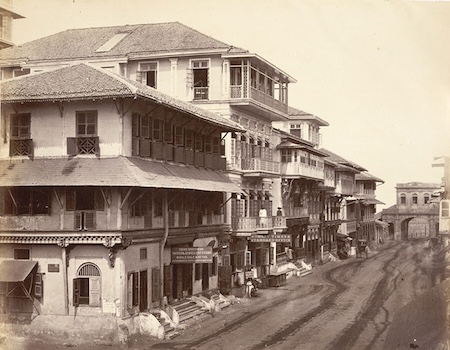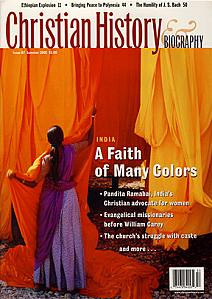BIG CHRISTIAN CONFERENCE IN BOMBAY ENDED WITH A PLEA FOR HELPERS

[ABOVE—Church gate street in Bombay Fort 1860 [public domain] https://oldphotosbombay.blogspot.com/2013/05/bandstand-revival-project-mumbai-nee.html]
IN THE NINETEENTH CENTURY, Protestants in India held decennial conferences (that is, conferences every ten years). This day, 4 January 1893, marked the end of the third, and largest, of those gatherings. Wilson College, belonging to the Free Church Mission, hosted the week-long meeting in Bombay [Mumbai].
The conference opened on 29 December 1892. Although more than seven hundred people are known to have attended, the official attendance figure (calculated from tickets of membership returned on the last day) was six hundred and twenty. These included two-hundred-and-fifty-six female missionaries and sixty-seven Indian workers.
Discussions, later printed in a two-volume conference report, ranged across such topics as social and legal rights of native Christians, the organization and self-support of the indigenous church, work among women, youth work, the importance of Christian literature, amity among missionaries of differing theological backgrounds, and many other matters of importance.
Presentation of each issue was followed by discussion. Such discussions brought out many interesting details because the missionaries possessed a wealth of experience. In a session on work among the lower classes, Rev. Lundborg described the effect of admitting a pariah to a school: “[T]he poor sweeper boy entered the mission school, and as soon as he had entered, the whole school, 150 boys and five schoolmasters, absconded. By this they thought to do away with the school altogether; but, thanks to the Lord, it was soon re-opened; but none of the former schoolmasters received back again. By this it is easily seen how much the lower classes are despised here.” Rev. J. Parsons noted in the same session that in some areas work among the lower classes needed to be accompanied by “social forms of work” because of economic desperation.
At the end of the conference, the delegates issued an urgent appeal “to the Church of Christ in Europe, America, Australasia, and Asia” for more missionaries and medical workers to conduct evangelistic work in India where the need was enormous. Among the clauses of that appeal were these:
We re-echo to you the cry of the unsatisfied heart of India. With it we pass on the Master’s word for the perishing multitude: ‘Give ye them to eat.’
An opportunity and a responsibility never known before confronts us. . . .
India has fifty millions of Mohammedans, a larger number than is found in the Turkish Empire; and far more free to embrace Christianity. Who will come to work for them?
Scores of missionaries should be set apart to promote the production of Christian literature in the languages of the people. . . .
Industrial schools are urgently needed to help in developing robust character in Christian youth and to open to them new avenues for honest work. . . .
The manifestation of Christ is greatest to those who keep his commandments, and this is his commandment: ‘Go ye into all the world and preach the Gospel to every creature.’
—Dan Graves
----- ----- -----
To learn more about the poor in India, who sparked the concern of the Bombay conference, watch India's Untouchables at RedeemTV.com
For more on Christianity in India, read Christian History #87, India: A Faith of Many Colors








